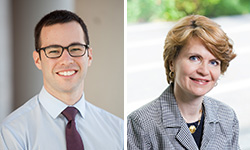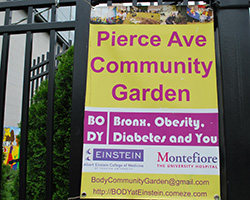

A New Doctors Impressive Body of Work
Ross Kristal: Improving People's HealthMind, BODY and Soul
Ross Kristal, a member of Einstein’s Class of 2015, improved the health and wellness of Bronx residents suffering from Type 2 diabetes and provided desperately needed emotional support for Type 1 diabetes patients in India… all while earning his medical degree from Einstein.

(Left) Ross Kristal, M.D., Class of 2015, (Right) Meredith Hawkins, M.D., an influential mentor to Dr. Kristal“It’s not surprising that Ross has accomplished so much already,” observed Dr. Meredith Hawkins, director of the Global Diabetes Institute and professor of medicine at Einstein. “He is uniquely gifted.”
“Dr. Kristal” first met Dr. Hawkins in 2009, during a summer research project for undergraduate students interested in attending medical school. A lifelong struggle with Type 1 diabetes led him on the path to science and medicine.
“I didn’t handle it well,” he acknowledged, referring to his diagnosis at age 7. “But in learning more about the disease, it was logical that I would develop an interest in the field of medicine. I also found that I wanted to help people in similar circumstances.”
Working with Dr. Hawkins on a project that highlighted the brain’s role in regulating glucose metabolism in humans, the University of Florida at Gainesville senior saw Einstein as a “good fit,” and applied to the school, officially becoming a medical student in August 2010.
“I was delighted to learn Ross had been accepted to Einstein,” said Dr. Hawkins, who also holds the Harold and Muriel Block Chair in Medicine. “He had the attributes to become an excellent doctor.”
Forging a Mission
Though he was motivated by his own illness, Dr. Kristal also was empowered by passage of the Affordable Care Act (ACA), which aimed to provide quality healthcare for all Americans while emphasizing the importance of keeping people out of the hospital. The new trend toward preventative medicine dovetailed well with ideas he had for addressing populations suffering from Type 2 diabetes.

Ross Kristal with support group he helped to establish while in South India with Dr. Hawkins. His work was supported by an Einstein Global Health Fellowship“Even though Type 2 diabetes is different from Type 1, I understand what patients with Type 2 are going through,” he said. “It’s frustrating to see so many people affected by diabetes, but Type 2 is reversible. I felt I could help.”
Type 2 is the most common form of diabetes, and its association with being overweight means changes in lifestyle and eating habits can have a dramatic effect on the lives of those fighting the disease. As a first-year student, Dr. Kristal took on that challenge by establishing the BODY Club. (BODY stands for Bronx, Obesity, Diabetes and You.) He reached out to his classmates through an e-mail, and 23 responded with an interest in joining his efforts.
“Ross demonstrated his ability to lead and to motivate others,” said Dr. Hawkins. “We need that in medicine.”
BODY aims to alter attitudes about food, nutrition and exercise in the Bronx. To do so, he and his classmates taught nutrition and exercise to local schoolchildren, and built a community garden around the block from Einstein and Montefiore with support from both institutions.
“I ran into one of the P.S. 89 students who remembered me from a nutrition lesson,” Dr. Kristal recalled. “He told me how he went grocery shopping with his mom and they read the nutrition labels together, which led them to go with the healthier option. It was so rewarding to learn that our lessons may be helping people.”
Five years later, BODY continues to change attitudes about nutrition. The program hands off leadership with each new first-year class.
Tackling Diabetes Abroad
But Dr. Kristal’s lasting impact as a doctor-in-training would not be limited to just the Bronx. Accompanying Dr. Hawkins to South India through support from the Global Health Fellowship Program, he initially hoped to bring aspects of BODY to its underserved communities. Once there, though, he learned they needed something else.

Entrance to the BODY Garden, one of several projects conducted by the BODY Club, which Dr. Kristal established as a first-year at Einstein.“They were lacking a support group for people with Type 1 diabetes,” said Dr. Hawkins. “Ross surprised me with how he adapted. Even though he hadn’t done anything like that before, he established the support group, which helped a lot of patients. And it’s still running today because Ross got people motivated.”
This first foray into the psycho-social aspect of medicine—designing a program to help others in dealing with the chronic disease he has dealt with most of his life—proved to be an eye-opening experience for him as well.
“I learned that members of the group felt their life didn’t have the same value as it had prior to being diagnosed,” he said. “They talked about feeling like a burden to their families. So, the fact that the support group is having a positive effect on their lives is terrific.”
Exploring an Interest in Population Health
Upon returning to the Bronx, he decided to take a year off to do research with Bronx CATCH (Collective Action to Transform Community Health). Under the guidance of Drs. Peter Selwyn, Arthur Blank and Judith Wylie-Rosett, he studied the factors associated with daily consumption of sugar-sweetened beverages among residents of the borough and the relevance of asking patients about such health behaviors. Information from the resulting paper in the January 8, 2015 issue of Preventing Chronic Disease was highlighted in Time magazine.
“I’m very interested in population health and understanding the effects of our behaviors on health,” said Dr. Kristal. “After I complete my residency, I see myself practicing internal medicine in an outpatient setting while also doing research in population health to address non-medical determinants of health.”
He added, “I wouldn’t be at all surprised if I ended up back in the Bronx. I loved interacting with the people in the community, and my time at Einstein. The administration was really supportive and I was surrounded by smart and creative peers. It was a privilege to work with them all.”
Posted on: Tuesday, July 7, 2015


